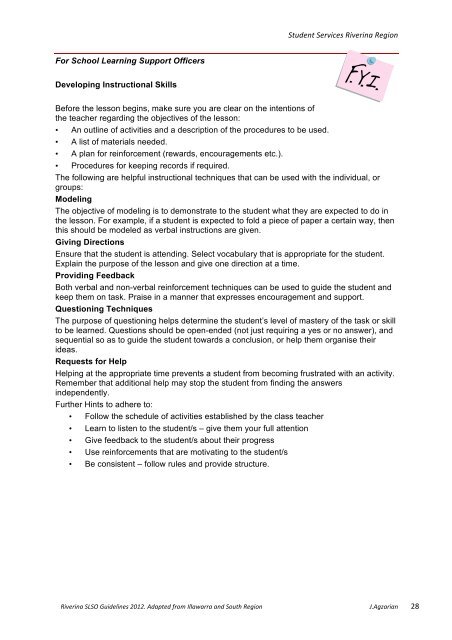A Resource for Teachers and School Learning Support Officers
A Resource for Teachers and School Learning Support Officers - Back
A Resource for Teachers and School Learning Support Officers - Back
Create successful ePaper yourself
Turn your PDF publications into a flip-book with our unique Google optimized e-Paper software.
Student Services Riverina Region <br />
For <strong>School</strong> <strong>Learning</strong> <strong>Support</strong> <strong>Officers</strong><br />
Developing Instructional Skills<br />
Be<strong>for</strong>e the lesson begins, make sure you are clear on the intentions of<br />
the teacher regarding the objectives of the lesson:<br />
• An outline of activities <strong>and</strong> a description of the procedures to be used.<br />
• A list of materials needed.<br />
• A plan <strong>for</strong> rein<strong>for</strong>cement (rewards, encouragements etc.).<br />
• Procedures <strong>for</strong> keeping records if required.<br />
The following are helpful instructional techniques that can be used with the individual, or<br />
groups:<br />
Modeling<br />
The objective of modeling is to demonstrate to the student what they are expected to do in<br />
the lesson. For example, if a student is expected to fold a piece of paper a certain way, then<br />
this should be modeled as verbal instructions are given.<br />
Giving Directions<br />
Ensure that the student is attending. Select vocabulary that is appropriate <strong>for</strong> the student.<br />
Explain the purpose of the lesson <strong>and</strong> give one direction at a time.<br />
Providing Feedback<br />
Both verbal <strong>and</strong> non-verbal rein<strong>for</strong>cement techniques can be used to guide the student <strong>and</strong><br />
keep them on task. Praise in a manner that expresses encouragement <strong>and</strong> support.<br />
Questioning Techniques<br />
The purpose of questioning helps determine the student’s level of mastery of the task or skill<br />
to be learned. Questions should be open-ended (not just requiring a yes or no answer), <strong>and</strong><br />
sequential so as to guide the student towards a conclusion, or help them organise their<br />
ideas.<br />
Requests <strong>for</strong> Help<br />
Helping at the appropriate time prevents a student from becoming frustrated with an activity.<br />
Remember that additional help may stop the student from finding the answers<br />
independently.<br />
Further Hints to adhere to:<br />
• Follow the schedule of activities established by the class teacher<br />
• Learn to listen to the student/s – give them your full attention<br />
• Give feedback to the student/s about their progress<br />
• Use rein<strong>for</strong>cements that are motivating to the student/s<br />
• Be consistent – follow rules <strong>and</strong> provide structure.<br />
Riverina SLSO Guidelines 2012. Adapted from Illawarra <strong>and</strong> South Region J.Agzarian 28


